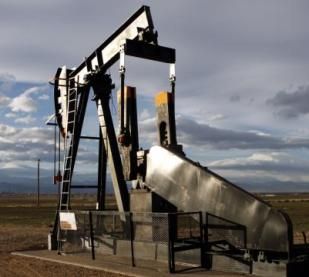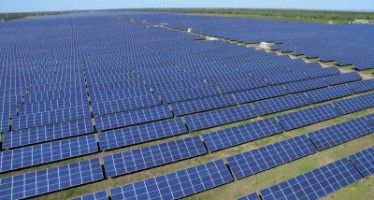Fracking with no freshwater — or water — increasingly common

 The next great environmental fight in California is likely to be over hydraulic fracturing, the energy extraction process that uses underground water cannons to blast away rock and reach oil and natural gas reserves. Gov. Jerry Brown appears ready to allow expanded use of fracking, as it is better known, after state officials complete work on updated regulations.
The next great environmental fight in California is likely to be over hydraulic fracturing, the energy extraction process that uses underground water cannons to blast away rock and reach oil and natural gas reserves. Gov. Jerry Brown appears ready to allow expanded use of fracking, as it is better known, after state officials complete work on updated regulations.
This is unacceptable to greens in California, who broadly reject the Obama administration’s conclusion that fracking is safe. Instead, they depict it as ruinous to the environment, as causing earthquakes and as using up enormous amounts of water that could be put to much better use.
The latter argument — because of its specific implications for drought-wracked California — is a constant presence on state message boards, letters to the editor and talk radio.
But some crucial research is rarely if ever cited. In a 2010 report, Harvard scientists concluded that energy produced by fracking appeared to use less water than the same amount of energy produced by conventional fossil-fuel extraction. “The increased role of shale gas in the U.S. energy sector could result in reduced water consumption,” wrote authors Erik Mielke, Laura Diaz Anadon and Venkatesh Narayanamurti. According to the energy industry, that’s just what has happened in the five years since.
Some big drillers no longer use freshwater
One reason is that technological advances have made it easier for drillers to recycle water than ever. This is from a 2013 Reuters story:
 MERTZON, Texas, Nov 21 (Reuters) – At a dusty Texas oilfield, Apache Corp has eliminated its reliance on what arguably could be the biggest long-term constraint for fracking wells in the arid western United States: scarce freshwater.
MERTZON, Texas, Nov 21 (Reuters) – At a dusty Texas oilfield, Apache Corp has eliminated its reliance on what arguably could be the biggest long-term constraint for fracking wells in the arid western United States: scarce freshwater.
For only one well, millions of gallons of water are used for hydraulic fracturing, or fracking, the process that has helped reduce U.S. reliance on foreign oil over the past five years by cracking rock deep underground to release oil and gas.
In Irion County, where Apache is drilling dozens of Wolfcamp shale wells in the Permian Basin, the company is meeting its water needs for hydraulic fracturing by using brackish water from the Santa Rosa aquifer and recycling water from wells and fracking using chemicals.
The company’s approach could have broader significance for areas prone to drought. Apache, which has the most rigs running in the Permian, the oil-rich region that spans 59 Texas counties, says the model can cut costs and truck traffic rattling small towns stretched by the country’s drilling boom.
“We’re not using freshwater out here,” Lucian Wray, production manager for Apache’s South Permian region, said of the company’s Barnhart operating area, which is run out of a former hunting lodge. “We are recycling 100 percent of our produced water. We don’t dispose of any of it.”
“Produced water” is a byproduct of oil and natural gas drilling. “Flowback” water is the fluid pushed out of a well during fracking. Apache is recycling both types, which are typically trucked away and put into underground disposal wells.
Some drillers frack without water entirely
And some drillers have stopped using water entirely. This is from a 2013 Houston Chronicle story:
The use of one precious fluid — water — to recover another — oil — chafes in dry country. Rivers and groundwater are receding in Texas for lack of rain and over-pumping just when the demand for water in new oil and gas fields is growing.
Now one exploration and production company in San Antonio is fracturing its wells mostly without water, using gas liquids instead, in a practice that’s beginning to spread. …
BlackBrush Oil & Gas LP is using a butane-rich mix for fracking after being confounded by many of the same obstacles other energy companies face in buying, moving and disposing of large amounts of water.
“Ranchers don’t want to give up their water,” said Jasen Walshak, production manager at BlackBrush.
The term gas liquids refers here to three fluids – propane, butane and pentane – that occur together with natural gas. They’re extracted from natural gas and sold, mostly as fuels.
Switching to gas liquids also seems to reduce controversy for BlackBrush.
“People don’t see water transfer lines all over the place,” Walshak said, referring to the yards and miles of pipe that move water from rural wells to oilfield tanks and rig trucks.
Environmentalists concerned about fossil fuels and global warming are certain to see a downside to these new approaches to fracturing even if they lead to far less water use.
But at the least, these developments show that energy exploration firms are listening to their critics. They realize that it’s in their interest to counteract the gripes about water use that are a staple of much fracking criticism.
Related Articles
Senate committee OKs increased energy regulation
A bill that ratchets up energy restrictions in California passed a Senate policy committee last week, despite concerns from business
Campus Political Rally
Katy Grimes: A California State University college faculty association has organized a rally for today, encouraging urging students to vote YES
CalWatchdog Morning Read – October 5
Wells Fargo fallout Trump’s past fallout Study: veterans and ex-cons suffer most from professional license mandate Legislative candidates go into




